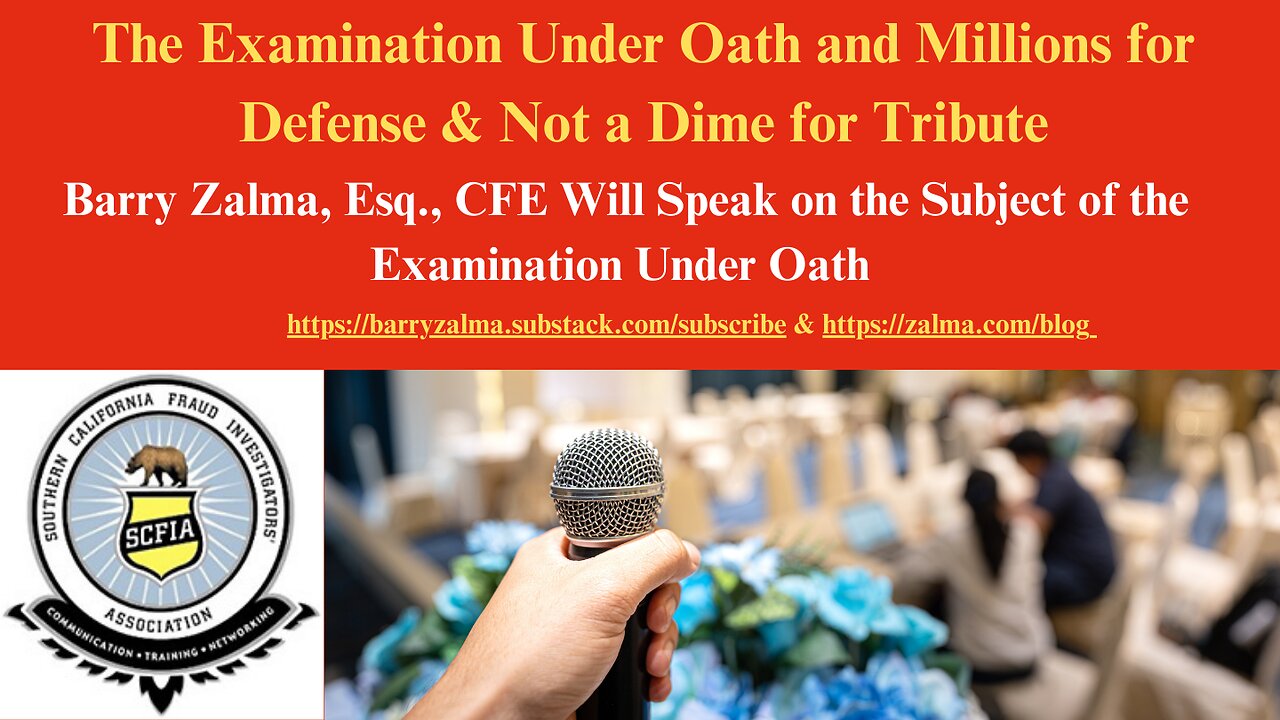Premium Only Content

Bad Faith Set Up Fails
Inadequate Information Made Refusal to Pay Policy Limits Not Bad Faith
INADEQUATE MEDICAL AUTHORIZATION USED TO CAUSE INSURER TO REFUSE SETTLEMENT DEMAND
Post 4930
Kara Flick appealed from the judgment after a jury rejected her claims for breach of contract and breach of the implied covenant of good faith and fair dealing. Flick contends the judgment should be reversed due to juror misconduct.
In KARA FLICK v. UNITED SERVICES AUTOMOBILE ASSOCIATION, B330507, California Court of Appeals, Second District, Sixth Division (November 5, 2024) the Court of Appeals resolved the dispute.
FACTUAL HISTORY
After sustaining injuries in an automobile accident caused by Francisco Reyes, Jr., Flick had her attorney send Reyes's insurer, the United Services Automobile Association (USAA), a letter explaining the severity of her injuries and an authorization for the release of her medical records. Flick's attorney followed up with a settlement demand two months later, requesting that USAA pay Flick the entirety of Reyes's $100,000 policy limit in exchange for a release of liability. Attached to the demand was a single medical record from Flick's neurologist.
USAA investigated Flick's claim and determined it did not have sufficient information to accept or reject her demand. Flick then filed a personal injury lawsuit against Reyes. The jury found in her favor and awarded nearly $1.7 million in damages.
Flick, with an assignment from the Reyes, sued USAA for breach of contract and breach of the implied covenant of good faith and fair dealing.
TRIAL
At trial, a USAA claims adjustor admitted that Reyes was fully at fault for the accident with Flick. Reyes could therefore be exposed to liability in excess of his policy limits-if Flick provided sufficient documentation to support her claim.
USAA's expert on insurance claims handling and another of its claims service managers both agreed with the supervisor that Flick's authorization was invalid and inadequate to allow USAA to obtain Flick's medical records.
USAA needed additional records before it could determine the value of Flick's claim. Those records could have included the medical bills Flick provided to her own insurance company, the multiple doctor's notes she had excusing her from work, or the thumb drive recording her purported speech problems, all of which were entered into evidence at her personal injury trial. Because they were not provided to USAA, it was "very difficult to place a value on" Flick's claim.
Flick's expert testified that USAA's handling of the settlement demand "was clearly unreasonable."
Flick also did not respond to USAA's requests for additional information.
By a vote of nine to three, the jury found that Flick did not make a reasonable settlement demand of USAA and rejected her claims for breach of contract and breach of the implied covenant of good faith and fair dealing. The trial court polled the jury, and each juror confirmed their vote.
DISCUSSION
The Court of Appeals concluded the trial court did not abuse its discretion in denying Flick's new trial motion. USAA successfully rebutted the presumption of prejudice by showing there is no reasonable probability that the juror, D.C.'s misconduct by not explaining he did not hear all of the adjuster's testimony, actually harmed Flick.
Much of the adjustor's testimony consisted of facts regarding his communications with Flick's attorney - facts that were undisputed.
What was disputed-whether Flick's settlement demand was reasonable-was the subject of other witness testimony, including USAA's expert on insurance claims handling, its supervising claims service manager, Flick's personal injury attorney, and her expert witness on insurance claims handling.
What the admitted evidence showed was that D.C. confirmed multiple times that he voted that Flick did not make a reasonable settlement demand:
Based on this record there was no reasonable probability that D.C.'s alleged juror misconduct actually harmed Flick.
ZALMA OPINION
The tort of bad faith arose from abuse by insurers on those they insured. Since its adoption in California about three quarters of a century ago, the abuse has been turned on to insurers. Ms. Flick's counsel placed a demand for settlement on USAA that it could not reasonably and in good faith to its insured, Reyes, because it was incomplete and inadequately supported and forced Flick and Reyes go through a trial where she received an uncollectible judgment against Reyes in hopes of a gigantic bad faith judgment. After much litigation and USAA spending a great deal to defend itself she received the $100,000 policy limit. USAA was punished but neither Flick nor her lawyers profited from the scheme or the appeal.
(c) 2024 Barry Zalma & ClaimSchool, Inc.
Please tell your friends and colleagues about this blog and the videos and let them subscribe to the blog and the videos.
Subscribe to my substack at https://barryzalma.substack.com/subscribe
Go to X @bzalma; Go to Newsbreak.com https://www.newsbreak.com/@c/1653419?s=01; Go to Barry Zalma videos at Rumble.com at https://rumble.com/account/content?type=all; Go to Barry Zalma on YouTube- https://www.youtube.com/channel/UCysiZklEtxZsSF9DfC0Expg
Go to the Insurance Claims Library – https://lnkd.in/gwEYk
-
 37:24
37:24
MichaelBisping
21 hours agoEDDIE ALVAREZ: Predicts Islam vs Arman, BKFC KnuckleMania, UFC 311 & More! (Interview)
13.4K6 -
 22:04
22:04
Scammer Payback
14 hours agoCrazy Scammers Spoof Emergency 911
41.5K9 -
 8:28
8:28
Misha Petrov
19 hours agoLiberals OUTRAGED Over Carrie Underwood Performing at Trump’s Inauguration
25.9K34 -
 22:34
22:34
Degenerate Plays
21 hours ago $2.01 earnedWe're Having Bedroom Problems... Literally - Five Nights At Freddy's 4 : Part 5
15K -
 1:00:10
1:00:10
Trumpet Daily
20 hours ago $5.09 earnedThe War to Restore America - Trumpet Daily | Jan. 14, 2025
11.9K8 -
 2:51:47
2:51:47
Price of Reason
15 hours agoJimmy Kimmel ATTACKS Trump and PROTECTS Gavin Newsom! Skeleton Crew Finale REVIEW! Ubisoft DEI Woes!
28.9K19 -
 5:14:42
5:14:42
JdaDelete
1 day ago $22.39 earnedThe Legend of Zelda: Skyward Sword HD | With SirPoopsMagee | Part 4
92K13 -
 4:56:18
4:56:18
Sgt Wilky Plays
12 hours agoTesting New setup and Chillin
80.3K5 -
 53:37
53:37
barstoolsports
18 hours agoOne Text Changes The Game | Surviving Barstool S4 Ep13
94.3K7 -
 3:14:48
3:14:48
Laura Loomer
11 hours agoEP93: Senate Grills Trump Admin Nominees As Inauguration Approaches
50.8K32